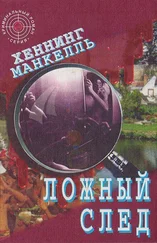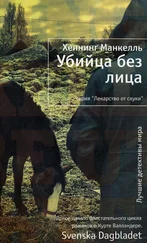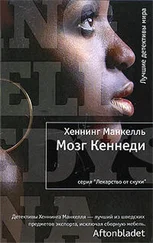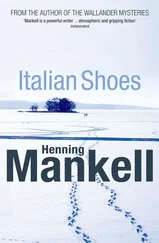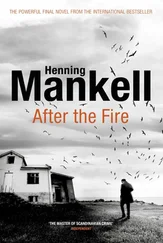“I’ve staked out many things in my day,” Alfredsson said. “I don’t think I’ve ever staked out a cash machine.”
“Sometime has to be the first. Do you have a gun?”
Alfredsson shook his head.
“Get him one,” Wallander said to Höglund. “And now let’s get going.”
It was nine minutes past five when Wallander left the station. He drove up to the department-store area with mixed feelings. Most likely he was completely wrong about this, but they had gotten as far as they could back there in the conference room. Wallander parked outside the Tax Authority building. The area was dark and deserted. Dawn was still some time away. He zipped his jacket and looked around. Then he walked over to the cash machine. There was no reason to remain concealed. The radio he had brought along made a noise. Höglund was broadcasting that they were all in place. Alfredsson had immediately run into problems. Some drunk young people had insisted they be allowed to make a withdrawal. He had called in for a patrol car to help him out.
“Let the car circulate between us,” Wallander said. “It will only get worse in an hour or so when people start waking up.”
“Martinsson took out some cash,” she said. “But nothing happened.”
“We don’t know that,” Wallander said. “Whatever happens, we’re not going to see it.”
The radio fell silent. Wallander looked at a knocked-over shopping cart in the parking lot. Apart from a small pickup truck, the lot was empty. It was twenty-seven minutes past five. Up on the highway, a large truck rattled past on its way to Malmö. Wallander started thinking about Elvira but decided he didn’t have the energy. He would have to come back to it, figuring out how he could have let himself be taken in like that. How he could have been such a fool. Wallander turned his back to the wind and stamped his feet. He heard a car approaching. It was a sedan painted with the logo of a local electrical firm. The man who jumped out was tall and thin. Wallander flinched and grabbed his gun, but then he relaxed. He recognized the man as an electrician who had once done some work for his father out in Löderup. The man nodded.
“Is it broken?” he asked.
“We’re not letting anyone make any withdrawals right now.”
“I’ll have to go across town, then.”
“Unfortunately that won’t be possible, either.”
“What’s wrong?”
“It’s only a temporary malfunction.”
“And they called in the police for that?”
Wallander didn’t answer. The man got back into his car and drove away. Wallander knew he would be able to keep warding people off with the explanation of a temporary malfunction, but he was already dreading the moment when it got out into the public. How had he thought it would work? Lisa Holgersson would put a stop to it the moment she found out. Their reasons were still mere speculation. He would not be able to do anything, and Martinsson would have more grist for his mill.
Then he caught sight of a man walking across the parking lot. It was a young man. He had emerged from behind the pickup truck, and he came walking toward Wallander. It took a few seconds for him to realize who it was. Robert Modin. Wallander was frozen to the spot. He held his breath. He did not understand. Suddenly Modin stopped and turned his back to Wallander, who sensed instinctively what was about to happen. He threw himself to the side. The man behind him had come from the direction of the department stores. He was tall, thin, and suntanned and he was carrying a gun. He was ten meters away and there was nowhere for Wallander to run. Wallander closed his eyes. The feeling from the field returned. The bitter end. Here but no longer. He waited for the shot that didn’t come. Slowly he opened his eyes. The man had the gun pointed directly at him, but he was looking down at his watch. The time, Wallander thought. It’s time. I was right. I still don’t know what is going to happen but I was right.
The man gestured for Wallander to come closer and to put his arms in the air. He pulled out Wallander’s gun and threw it into a garbage can next to the cash machine. Then he held out a plastic card in his left hand and said some numbers in broken Swedish.
“One, five, five, one.”
He dropped the card on the pavement and pointed at it with his gun. Wallander picked it up. The man took a few steps to the side and looked down at his watch. Then he pointed to the bank machine. His movements were more violent now. For the first time the man looked nervous. Wallander walked up to the machine. When he turned slightly he could see Modin still standing in the spot where he had stopped. Right now Wallander didn’t care what would happen when he put the card in and entered the numbers. Modin was alive. That was all that was important. But how could he continue to protect him? Wallander was searching for a way out. If he tried to attack the man behind him he would immediately be shot. Modin would probably not have time to run away. Wallander fed the card into the machine. At the same time a shot rang out. A bullet hit the ground nearby and whined away. The man spun around. Wallander turned and saw Martinsson about thirty meters away on the other side of the street. As the man aimed at Martinsson, Wallander leaped at the garbage can and pulled his gun out of the trash. The man shot at Martinsson but missed. As he turned back around, Wallander shot him in the chest and he collapsed.
“What’s happening?” Martinsson yelled.
“It’s safe to come over,” Wallander yelled back.
The man on the pavement was dead.
“What made you come here?” Wallander asked Martinsson.
“If your hypothesis was right, it had to be here,” Martinsson answered. “It makes sense that Falk would have chosen the bank machine closest to his house and that he always went past on his evening walks. I asked Nyberg to keep an eye on the cash machine downtown where I was.”
Martinsson pointed at the dead man.
“Who is he?”
“I don’t know. But I think his name starts with the letter ‘C.’”
“Is everything over now?”
“Maybe. I think so. But I don’t even know what it is that’s over.”
Wallander should have thanked Martinsson, but he didn’t say anything. Instead he walked over to Modin, who was still standing in the same spot. There would be time enough for him and Martinsson to talk later.
Robert Modin’s eyes were filled with tears.
“He told me to walk over to you. He said otherwise he would kill my mother and father.”
“We’ll talk about all that later,” Wallander said. “How are you feeling?”
“He told me to say I had to stay and finish my work in Malmö. Then he shot her. And we left. I was in the trunk and could hardly breathe. But we were right.”
“Yes,” Wallander said. “We were right.”
“Did you find my notes?”
“Yes.”
“I didn’t start taking it seriously until much later. A cash machine. A place where people come to take out their money.”
“You should have said something,” Wallander said. “But maybe I should have thought of it myself. We knew it had something to do with money, after all. It should have been an obvious choice to hide something like that.”
“An ATM as the launching pad for their virus-bomb,” Modin said. “It has a certain finesse, don’t you think?”
Wallander looked at the boy by his side. How much longer could he handle the strain? Suddenly he was hit by the feeling of having stood like this before with a young boy at his side. Then he realized he was thinking of Stefan Fredman. The young boy who was now dead and buried.
“What was it that happened?” Wallander asked. “Do you think you can tell me?”
Читать дальше


